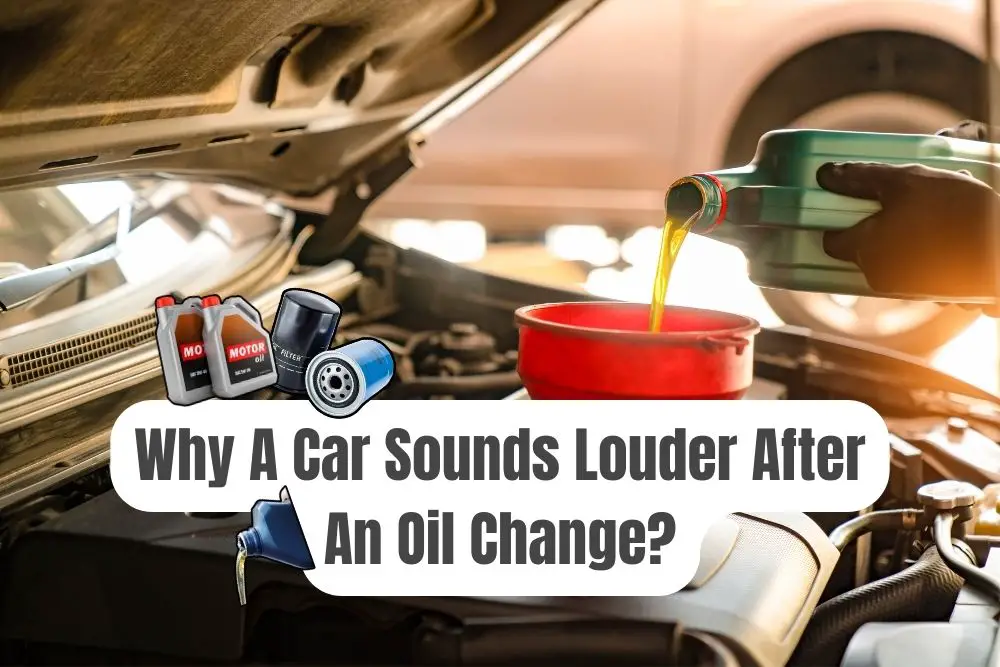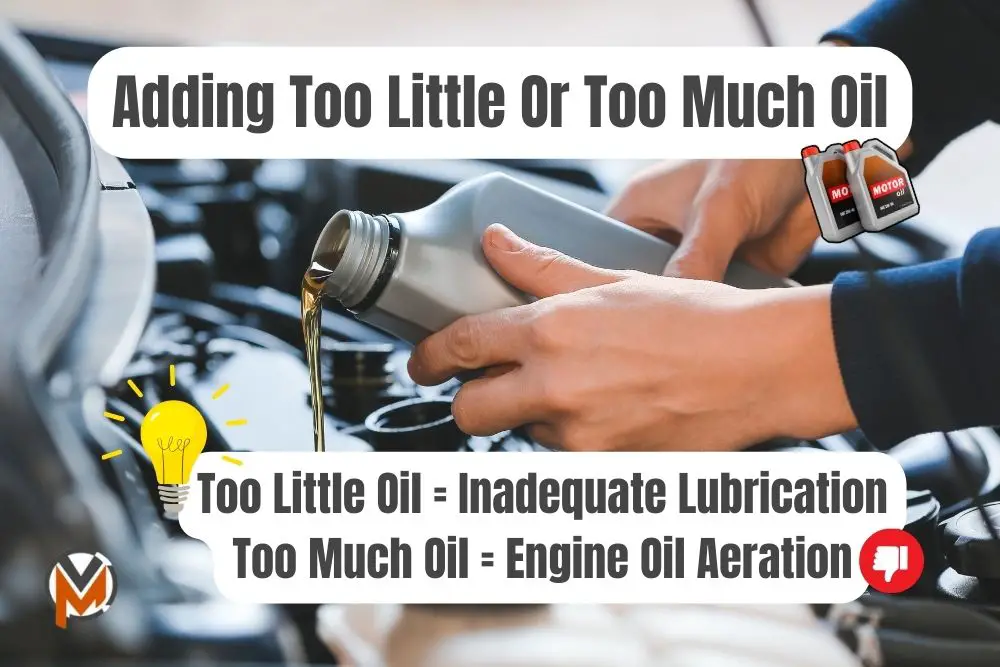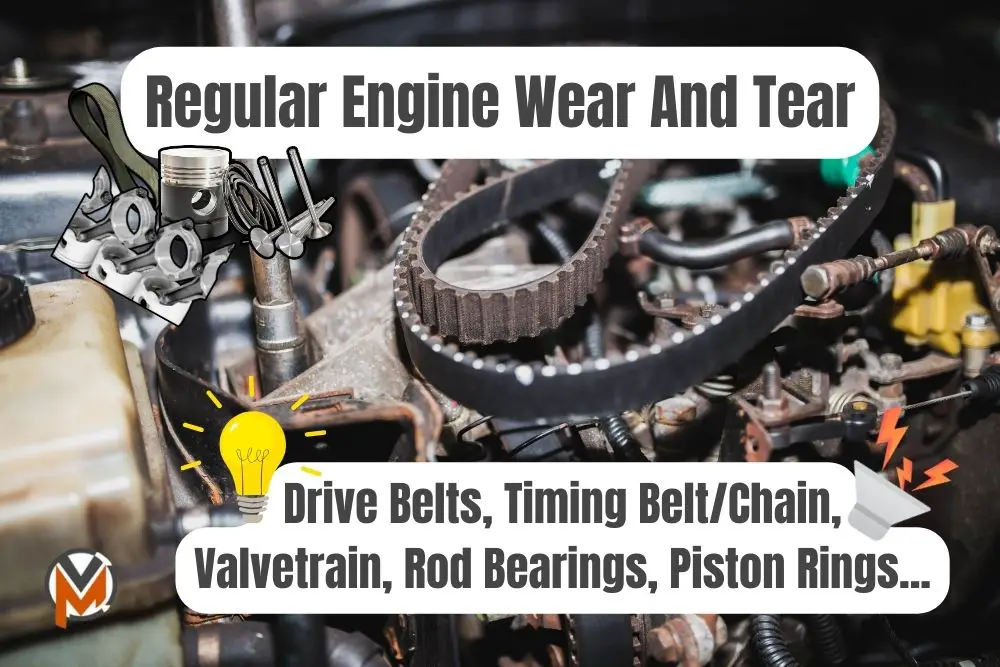This is something that I’ve encountered before, either while performing an oil change on my own car, or for someone else’s, which is where your car sounds louder when accelerating after getting an oil change.
It can be peculiar when you experience it at first, given that oil changes are supposed to be good for a car, not cause more issues like odd noises from the engine. Therefore, hearing it signals a potential problem.
There could be many reasons why a car sounds louder when accelerating after getting an oil change, such as using the wrong oil viscosity, adding the incorrect oil level, and a loose oil filter, among many others.
Here are some of the most common reasons why your engine is louder under acceleration, after getting an oil change (click on each one to skip ahead to that section to learn more):
- Using the wrong oil type and viscosity
- Adding too little or too much oil
- Poor quality motor oil filter
- Regular engine wear and tear
- Improper installation of components
- Misc. other mechanical & engine issues
Possible Reason #1: Using The Wrong Engine Oil Type And Viscosity
This is a mistake that’s far more common than admitted, especially for folks performing their own engine oil changes. So, make sure that when you’re changing the oil, double-check the oil type and viscosity.
Different engine oils have different thicknesses (aka viscosity). Thinner oils, while improving fuel efficiency, may not dampen engine noise as effectively as thicker oils. Moreover, motor oil is not interchangeable.
You can’t simply, for example, willy-nilly decide to use engine oil that’s a different viscosity from what was recommended for your car. An easy way to tell which motor oil is ideal, is by checking the owner’s manual.
Ensure that the engine oil you’re using matches your car’s specifications. If the noise is bothersome, consult a mechanic about possibly using a slightly thicker oil that’s still appropriate and compatible with your car.
Possible Reason #2: Adding Too Little Or Too Much Oil
This is, once again, another common mistake made by people who are changing the engine oil for the first time… Adding either too little or too much engine oil, then what is the recommended and proper level.
When you add too little oil, that’ll lead to inadequate lubrication, increasing friction and noise. Meanwhile, too much oil would aerate motor oil, also increasing engine noise. So, neither is the ideal scenario.
Therefore, when you’re changing your car’s motor oil, make sure you pay close attention to what the ideal oil level is. The easiest way to do this is by referring to the dipstick to know how much oil you’ve put in.
As such, be wary of how much engine oil your car really needs. Otherwise, if you’ve added too much or too little, adjust the oil levels to the proper level. Regularly monitoring the oil level can prevent this issue.
Possible Reason #3: Poor Or Low Quality Oil Filter
Your car’s oil filter is a crucial element of the oiling system. It simply functions to filter out debris and other contaminants from clogging up the oiling system. And, ensuring that your engine gets clean, filtered oil.
The general rule of thumb that I subscribe to, is to swap the oil filter during every oil change. But, if you’re in a pinch, it’s possible to only replace the oil filter with every other oil change, though avoid that if possible.
Otherwise, using an overly-worn oil filter or opting for a low, poor-quality motor oil filter, may not be able to effectively remove contaminants, leading to dirtier engine oil and increased engine wear and noise.
With that in mind, I’d highly recommend that you choose a good, high-quality oil filter. It’s a pretty minute investment that can massively impact your engine’s health, smoothness, driveability, and noise levels.
Possible Reason #4: Long-Term Engine Wear And Tear
I’m quite familiar with this phenomenon, as someone who loves tinkering with vintage cars. Yet, it’s a fact that older car engines, or those with a high enough mileage, would naturally wear down, as they age.
This will consequently lead to increased engine noise, which becomes more noticeable after an oil change. Therefore, while this issue isn’t caused by an oil change, an oil change does highlight an engine’s state.
The most common engine components that might emit unusual sounds as they wear can include the drive belts, your timing belt or chain, the valvetrain, connecting rod bearings, piston rings, and much more.
To prevent this, regular maintenance is key. While some noise is normal for older engines, unusual sounds should be checked by a professional. Therefore, it’s still wise to have this diagnosed and inspected.
Possible Reason #5: Improper Installation After The Oil Change
Unlike more complex repair jobs, like rebuilding an engine, changing the motor oil doesn’t require a huge amount of disassembly. For the most part, some cars may ask that you uninstall the splash shield.
This is rare though, as the vast majority of cars could have oil changes be done without needing to remove or disassemble anything. Still, on the off-chance that your specific car does require some disassembly…
It’s possible that some components were not properly reattached and re-installed after the oil change, and this can rattle or cause additional noise. So, it’s a good idea to double-check these after the oil change.
It’s good practice to perform a quick check to ensure all the components are secure. If you find loose parts, tighten them or consider consulting a mechanic to do it. This is a fairly rare case, but it can happen.
Possible Reason #6: Unrelated Mechanical Or Engine Problems
This is another peculiar consideration, but if your car sounds louder when accelerating after an oil change, it might not actually be caused by that oil change. Rather, it might be coincidental, a sign of other issues.
Some of these other, unrelated or miscellaneous mechanical or engine-related issues include a faulty brake system, exhaust system leaks, worn transmission, or woes with your steering or suspension assembly.
Elsewhere, there might also be problems with your air intake system, a failed water pump, worn alternator bearings, a bad power steering pump, problems with your AC compressor, and loose belts or pulleys.
If that noise persists, have your vehicle checked for other issues. Regular servicing could help identify and address faults early on, and prevent your car from sounding louder when accelerating after an oil change.



